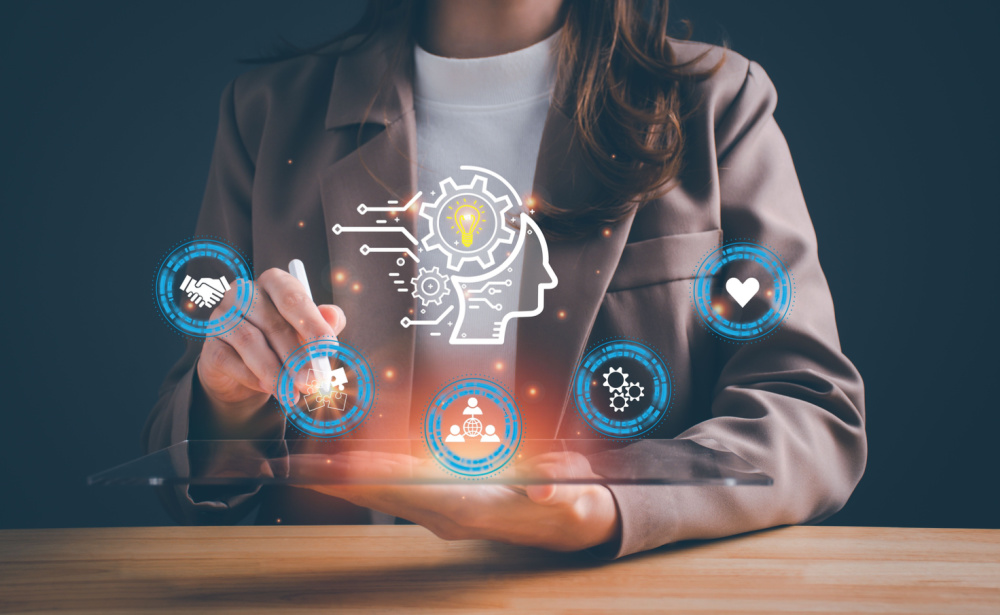
Beyond the Horizon: GenAI and Ethical Leadership
Beyond the Horizon: GenAI and Ethical Leadership
Prefer to listen to the article? Click below to access our AI speech-generated audio. However, if you want to read it as usual, keep scrolling.
Beyond the Horizon: GenAI and Ethical Leadership
In this blog post, keynote speaker Bailey Parnell gives us a few snippets of her exciting keynote speech at our upcoming Leadership Horizon event. We discuss the transformative role of generative AI in modern organizations, delve into how AI can boost well-being, and touch upon ethical considerations leaders must address. Enjoy reading!
Bailey, as we approach the Leadership Horizon event on 04.04.2024, could you start by giving us a brief overview of your upcoming keynote? What can attendees expect to learn and gain from your presentation?
My keynote at the Leadership Horizon event will delve into the transformative role of generative AI (GenAI) in modern organizations. We will explore how AI can revolutionize productivity and performance, but also how this does not need to be at the expense of wellbeing.
Rather, there are ways that AI can support our well–being dramatically in the process. I will share the early findings of my research concerning how GenAI could and should support leadership functions and I’ll do this through the exploration of real-world applications and strategies, ethical considerations, and case studies.
The goal is to leave attendees enlightened about AI’s potential and equip them to integrate these technologies in ethical ways that both support human well-being and performance.
The theme of your keynote revolves around GenAI and its potential impact on organizations and individuals. Can you elaborate on the core potential and challenges of GenAI in contemporary settings, and how it connects to leadership and wellbeing?
GenAI presents vast innovation potential, automating complex tasks, enhancing decision-making, and radically improving efficiency across various sectors. It fosters creativity, generates solutions quickly, and personalizes user experiences, all of which can lead to significant advancements in many fields.
For example, in healthcare, GenAI can help with early disease diagnosis, personalized treatments, and accelerated drug development. However, at the same time, GenAI faces significant challenges, including ethical concerns around data privacy and consent, potential biases in AI algorithms, and the risk of job displacement due to lazy or inconsiderate leaders.
In the same example, GenAI raises concerns about patient data privacy, consent, biases, and job displacement of healthcare workers. These challenges require careful consideration to harness AI’s potential while maintaining ethical standards fully… and our humanity.
About leadership and well-being, I mentioned above how it can offer leaders tools to make more informed decisions, predict trends, and optimize operations, which would presumably lead to improved organizational performance. However, for both leaders and employees, it can also reduce mundane tasks and allow people to focus on more fulfilling and creative work.
This might enhance their job satisfaction and mental well–being. Leaders have a tough job ahead. They must navigate the ethical complexities of AI, answer questions they’ve never had to answer before about humanity, and then also use these tools to support their already-existing objectives.

With your background in both digital well–being research and teaching businesses the skills they need to succeed, could you share some insights on how GenAI can be harnessed to boost both organizational productivity and employee well–being simultaneously?
My research in digital well-being and work with my learning design company have shown me many ways GenAI can significantly boost organizational productivity and employee well-being. Let’s look at 5 potential dual-intent uses for both performance and well–being (some of which we may explore again in the keynote):
1. Automating Routine Tasks
GenAI can handle repetitive or mundane tasks (such as report generation or scheduling). This frees employees to focus on more meaningful and creative work, thus enhancing job satisfaction and reducing burnout.
2. Personalized Employee Training
GenAI can tailor training programs to individual learning styles and professional development needs, which could simultaneously improve learning retention and also foster a more engaged and skilled workforce.
3. Enhanced Decision-Making
By providing data-driven insights and forecasts, GenAI aids in more informed decision-making, which could reduce stress and uncertainty for employees and leaders.
4. Workplace Wellness Analysis
GenAI could analyze workplace data to identify patterns related to stress, workload, and employee engagement, which would help organizations implement targeted wellness initiatives.
5. Improved Communication and Collaboration
GenAI tools can streamline communication and project management, which could lead to a more cohesive and less stressful work environment.
The list of potentials goes on…
Many people are concerned about the ethical implications of AI technologies. How can organizations strategically integrate AI to improve productivity and well–being while proactively addressing ethical questions associated with AI?
I have come up with 9 ethical considerations leaders have to make when it comes to integrating GenAI in their workplaces (this may also come up in the keynote). They must work through most of these before full integration.
At the same time, this technology is new, so be adaptable and realize things may come up that you did not intend. This is just what happens with any technological revolution. But, you can start here…
1. Data Privacy and Security – Ensuring the confidentiality and security of employee and company data.
2. Bias and Fairness – Addressing potential biases in GenAI algorithms and ensuring GenAI decisions are fair and non-discriminatory is crucial.
3. Transparency and Explainability –Transparency in how GenAI systems make decisions.
4. Consent and Choice – Respecting employee consent regarding the use of their data and providing options to opt out of GenAI monitoring or analysis, where appropriate.
5. Impact on Employment – Considering the impact of GenAI on job displacement and the ethical implications of replacing human labor with GenAI.
6. Mental Health and Wellbeing – Being mindful of the impact of GenAI on employee mental health and wellbeing, particularly regarding surveillance, performance monitoring, and increased expectations.
7. Accountability and Responsibility – Clear accountability for decisions made by GenAI systems and mechanisms for redress in case of errors or grievances.
8. Regulatory Compliance – Adhering to legal standards and regulations governing the use of GenAI in the workplace.
9. Employee Development and Training – Addressing the need for upskilling or reskilling employees in the wake of GenAI integration.

In your keynote description, you mention that attendees will learn how GenAI will affect their specific industry and function. Can you provide some examples or insights into how different industries can leverage AI for leadership and employee well–being?
The truth is that GenAI will affect most if not all industries eventually. I mean that.
I have already discussed healthcare above where GenAI can assist in diagnosis and patient care. In finance, GenAI could improve risk assessment and fraud detection. For creative industries, GenAI already offers tools for design and content creation, thus freeing up time for strategic thinking and innovation.
Every sector can leverage AI for leadership development, decision-making, and simple tasks like report-making. In addition to the examples I gave in question 3, here are some other assorted industries we can use and examples in a fun brainstorm…
Manufacturing Industry:
a. Performance – GenAI can optimize production lines by predicting maintenance needs and streamlining supply chain management.
b. Employee Wellbeing – GenAI can enhance safety by monitoring working conditions and predicting potential hazards.
Education Industry:
a. Performance – GenAI can create personalized learning materials and curricula and adapt them to individual student needs.
b. Employee Wellbeing – For educators, GenAI can reduce administrative burdens like grading and lesson planning, giving teachers more time to focus on student engagement and reducing work-related stress.
Aviation Industry:
a. Performance – In aviation, GenAI can assist in the predictive maintenance of aircraft, and optimize fuel efficiency through advanced flight path calculations.
b. Employee Wellbeing – GenAI can also aid in managing flight crew schedules more effectively to ensure adequate rest periods and reduce fatigue.
As you can see, this exercise could be done in any industry.
How do you see GenAI impacting the average person’s daily life? Are there practical applications that individuals can use to make their lives easier?
From personalized recommendations in entertainment and shopping to smart home devices that learn and adapt to user preferences, GenAI improves convenience and efficiency in the household as well.
AI-driven apps can help people with personal budgeting, fitness routines, building resumes, and even mental health support. I have seen this first-hand in my own family with people who are otherwise technical novices and digitally illiterate. It has made their lives easier.
As someone who has given two TED talks with millions of views, what key takeaways do you hope to leave with your audience after this keynote? How do you envision your audience feeling more confident in navigating the future of AI?
After my keynote, I believe the audience will feel slightly uneasy, but not in a bad way. This is normal when you are suddenly able to see the eventualities of the future and the major changes that will come with them.
However, my goal is to quell that unease with a framework for how they can approach these changes as they come, and even provoke them in responsible ways.
I aim for the audience to feel empowered and optimistic about the future of GenAI. My goal is for attendees to leave with a clear vision of how to integrate AI into their leadership and operations confidently.

Considering your role as the Founder & CEO of SkillsCamp and your recognition as one of Canada’s Top 100 Most Powerful Women, what personal experiences or professional milestones have shaped your understanding of the intersection between leadership, AI, and connectedness?
I went through my existential crisis when GenAI was released to the public. The reason for my stress was not because I was stressed about how it would affect me. In fact, I am now AI-assisted in every area of my life, including the leadership of my business as a non-profit.
Rather, I was concerned about how bad actors would use this technology and I was worried about all of the digitally illiterate people who have no idea what is coming.
I have been researching digital wellbeing for over a decade and I still feel like I’m only able to scratch the surface with most people and share “What is even going on here”. I snapped out of my crisis when I remembered I am better equipped than most people in the world to help humanity through this shift, given my experience, my education, and my profession.
It gave me even more motivation to continue my research, teaching, and speaking, and to turn my non-profit into the Center for Digital Wellbeing. So, this is very personal for me now.
In the context of leadership, can you share any personal anecdotes or case studies where the responsible use of GenAI has had a transformative impact on an organization’s success and employee well–being?
Easy. I can talk about my organization for this one. It has made my work better and faster. I already use GenAI, mostly ChatGPT, every day. Here are a few ways I use it to support my humanity as an entrepreneur of a learning design and development company…
- I have prompted ChatGPT by giving it a program overview, goals, design, methodology, etc., and said could you write me an executive summary for a proposal that is no longer than X characters.
- I have told GPT the learning outcomes of a workshop on collaborative leadership and asked it to help me come up with role-play scenarios that mid-level managers could use in a workshop to practice X skills.
- I have given it a set of data from a feedback form and asked it to pull the main themes from the answers with quotes for proof.
- I have required leaders in leadership programs to use it as part of assignments (to prepare them for the future).
- I have encouraged my staff to use it to enhance their work and make their lives easier (and I have not replaced it with more work).
Right now, I of course double-check and edit answers for validity, accuracy, authenticity to our brand, etc. But this is just the start. I doubt I’ll even have to do that in the future.
Finally, what advice would you offer to leaders and professionals looking to stay ahead in the age of GenAI and connectedness? How can they prepare themselves and their organizations for the future you’ll be discussing in your keynote?
To stay ahead in the GenAI era, leaders should embrace continuous learning about GenAI advancements and not fear change – own your role in shaping it.

Bailey Parnell
Keynote speaker and entrepreneur
Bailey Parnell is a world-renowned speaker, theorist, entrepreneur, and pioneer in the field of digital wellbeing. At just 22 years old, Bailey was named one of Canada’s Top 100 Most Powerful Women. Since then, she has partnered with prestigious organizations like the United Nations, Deloitte, the NFL, and various governments and universities around the world to share her insights on our digital lives, generative AI, human skills development, and leadership in the future of work.

